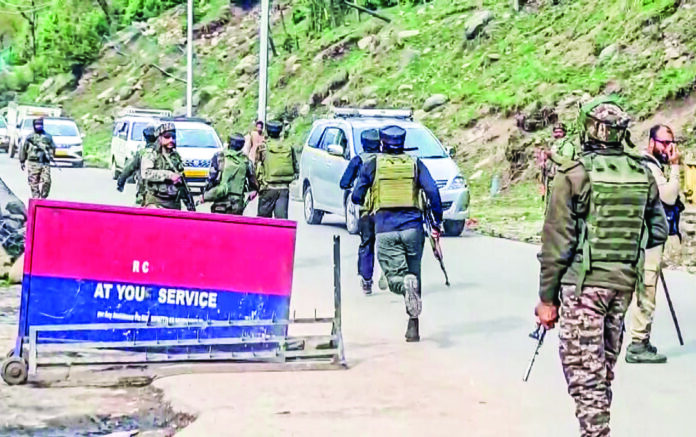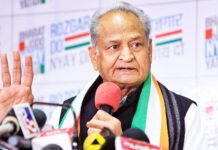
India’s diplomatic outreach and counterterrorism measures should extend to the EU as well.
NEW DELHI: The terror attack in Pahalgam in Kashmir and India’s decision to wage a war against terror make it essential for India to, among various strategies, expand and deepen its diplomatic counterterrorism engagements with the European Union as well.
The world has deeply sympathized with the terror victims who had gone to Pahalgam in Kashmir as tourists and were brutally shot dead by terrorists. The cowardice and the sick mindset of the terrorists are reflected in their decision so far to hide their identity and keep secrets of their main goals.
Those who consider it to be the handiwork of The Resistance Kashmir (TRK), an unknown outfit, should know that the suspected backers of such mindless acts of violence against unarmed tourists have ironically sympathized with the dead and shed crocodile tears just across the Indian border.
Besides the impact of such terror attacks on the victims and their family members, another consequence of this event will be the rapid downfall of the tourism industry in Kashmir, which in turn will affect the livelihood of numerous Kashmiri people.
It is nonetheless clear that the Pahalgam attackers were not lone wolves and had the full support of Pakistan. It is not a conspiracy theory to suggest that the Pakistani establishment, which has not been able to maintain law and order in Balochistan and Pakhtunkhwa; that has failed in its economic and social welfare policies; and has been largely ineffectual in its foreign engagements, orchestrated the dastardly act in Pahalgam.
While the world has promptly reacted to this incident by condemning it and sympathizing with the victims, the response of the European Union is a welcome development from the Indian perspective. While expressing her “deepest condolences” to Prime Minister Narendra Modi, President of the European Commission Ursula von der Leyen said that “Europe will stand with you.” EU foreign policy chief Kaja Kallas said that “the EU stands firm against terrorism”.
However, the fast reactions of major powers of the European Union were less reassuring and carried standard sentences of grief and condolences. As per reports, German Chancellor Olaf Scholz condemned “the heinous terrorist attack” and said “Our thoughts are with the families of the victims and we wish a speedy recovery for all the injured. Our heartfelt condolences go out to the people of India.” French President Emmanuel Macron said: “We share the profound sorrow of the victims’ families, to whom I extend my heartfelt condolences.” British Prime Minister Keir Starmer said that his thoughts were with those affected and with the people of India. Italian Prime Minister Giorgia Meloni expressed solidarity with the affected families, the injured, the government, and the entire Indian people.
It is heartening to note that relatively a smaller member of the EU, Denmark, had a stronger reaction when it echoed the President of the European Commission and the EU foreign policy chief. Danish Prime Minister Mette Frederiksen, in her message to India, said that “Denmark stands with India and strongly condemns all acts of terrorism”.
The EU’s gesture soon after the Pahalgam terror attack is commendable. As Herve Delphin, Ambassador of the European Union to India and Bhutan, wrote in X, “EU Ambassadors & the Board of the Federation of European Business in India FEBI gathered to observe a minute of silence in memory of the victims of the horrible Pahalgam terrorist attacks. Team Europe/EU family in India stands together with India in this moment of mourning.”
However, the reactions of the United States, Israel and Russia have been most reassuring to India in its war against terrorism. President Trump emphasized that “India and the United States stand together in the fight against terror,” and wrote in his Truth Social post that “Prime Minister (Narendra) Modi, and the incredible people of India, have our full support and deepest sympathies. Our hearts are with you all!” Russian President Vladimir Putin reiterated Russia’s commitment to fighting terrorism in all its forms and manifestations with India. Israeli Prime Minister Benjamin Netanyahu extending Israel’s support for India in its fight against terrorism and said that “Israel stands with India in its fight against terrorism.”
India has to work hard diplomatically to team up more deeply with Europe in its “war against terrorism”. Europe itself has been a periodic battleground where the States face numerous terrorist threats and activities. According to Global Terrorism Index 2025, “mainland Europe has seen a troubling surge in terror attacks, including knife assaults and vehicular rammings. These attacks have been executed by individuals with extremist ideologies, mostly by individuals who came to European countries under the guise of seeking refuge or asylum. Continuous attacks have instilled a pervasive sense of insecurity among the locals in these countries.”
This report, released last month in London, says that the number of countries recording a terrorist attack increased from 58 to 66 and the Islamic State (IS) has expanded “its operations to 22 countries and remains the deadliest organisation”. The 9/11 terror attacks on the United States that had led to a global war against terrorism led by the United States was also responsible for getting European boots on the ground in neighbouring Afghanistan. As part of the North Atlantic Treaty Organisation, the European countries had endorsed the invocation of Article 5 of this security organization to wage the war against terrorism in Afghanistan.
While it is true that the Pahalgam terror attack is much smaller in scale than the 9/11 attacks, it can lead to escalation of terrorist violence, unless dealt with strongly now. India has begun to take measured steps against Pakistan to restrain the terrorist organisations that operate with full knowledge and assistance of the Pakistani establishment.
But India’s diplomatic outreach and counterterrorism measures should extend to the EU as well. In the current geoeconomic churn at the global level, India and the EU are working hard to forge much deeper and expansive economic ties. For the safety of trade and investment collaborations, a terror-free ecosystem is an imperative.
Poland, the current President of the European Union, should take due note of the terror threats in South Asia and provide leadership to forge closer counterterrorism ties with India. While the EU Council has its own strategy of countering terrorism, it is mostly focused on West Africa, the Middle East and European continent. It should expand its policy and coordinate with India as well. In this globalizing world, terror networks are not localized operations. It is thus important for India and the EU to extend further and coordinate efforts to deal with terrorism.
* Chintamani Mahapatra is Founder Chairperson, KIIPS and Editor, India Quarterly.







